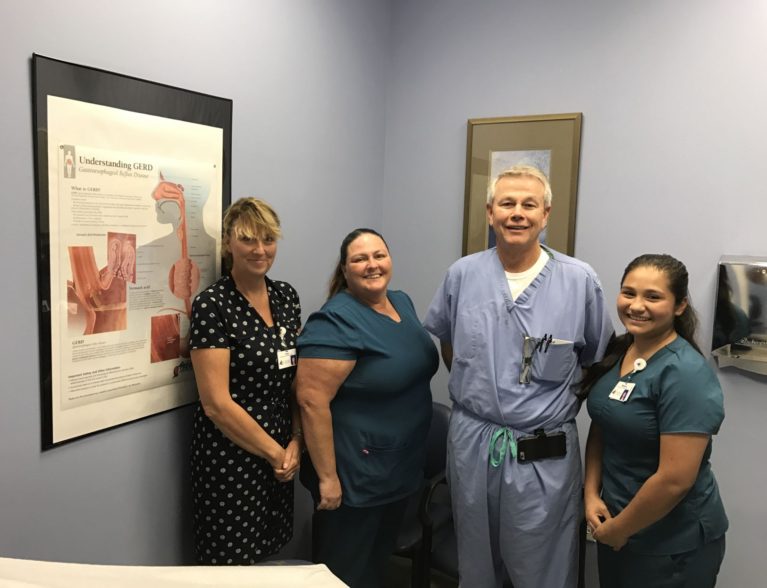
For well over a decade, gastroenterologist Dr. Stephen Fitzgerald treated patients throughout Brevard County, from Melbourne and Palm Bay to Viera and Indian Harbour, with Omni Healthcare. Today his patients can find him a few miles to the south at the Sebastian River Medical Center.
As a gastroenterologist, Fitzgerald’s areas of expertise include the health and treatment of diseases affecting the entire digestive system, including the esophagus, the stomach, the small intestine, the colon and rectum along with the pancreas, gallbladder, bile ducts and liver, and he says there is some good news in his field of practice, including a declining rate of colorectal cancer and improved drugs for treatment of Hepatitis C, ulcerative colitis and Crohn’s disease.
According to the American College of Gastroenterology, some of the most common problems doctors like Fitzgerald deal with on a daily basis are colon polyps, cancers, hepatitis, heartburn, peptic ulcers, gallbladder and biliary tract diseases, nutritional problems, irritable bowel disease (including Crohn’s disease and ulcerative colitis), and pancreatitis.
In other words, it’s a job that’s probably best suited to someone with an eidetic or near-perfect memory along with the ability to teach as well as to diagnose and treat his or her patients.
That seems to describe Fitzgerald perfectly. After finishing his residency and fellowship at Wright State University, the silver-haired Fitzgerald says he served 10 years on the faculty of the Wake Forest Medical School.
The first topic Fitzgerald tackles is colorectal cancer screening, and the affable GI doctor starts with some good news. That particular disease, he claims, is actually declining in the United States – in part because of efforts to screen those 50 years of age and older with colonoscopies and in part because of improvements in home colon cancer tests such as Cologuard.
“These newer [home] tests” according to Fitzgerald, “are incorporating DNA. They’re not only looking at blood in the stool, they’re looking at DNA. So, they’re combination tests.”
Since the National Cancer Institute says colorectal cancer “is the third most common type of cancer in men and women in this country,” the drop in the number of cases is at least a little encouraging, though Fitzgerald quickly adds two salient points.
First, he says, “the colorectal cancer rate is declining – except in the 29-49 year old group – because we’re screening those age 50 and older but we’re not screening those aged 29-49.”
Then he flatly states that while the home tests are improving, “they’re not as good as colonoscopy.”
Fitzgerald admits it’s not unheard of to have somebody say, “I don’t want a colonoscopy. My sister-in-law had a colonoscopy 15 year ago and got a perforated bowel. She had a negative outcome from a colonoscopy, so I’m not gonna have a one.”
However, AdvocateHealth.com says, “Gastroenterologists perform higher quality colonoscopies and provide more comprehensive care for gastrointestinal conditions than any other physicians. This translates to more accurate detection of polyps and cancer, fewer complications from procedures and less time in the hospital for patients treated by GI specialists.”
And real-time colonoscopies are far more detailed than any mail-in home test could ever be.
Advances in gastro-related pharmaceuticals are another area of good news in Fitzgerald’s view. Specifically, he points to treatments for Hepatitis C and of the irritable bowel diseases, ulcerative colitis and Crohn’s disease.
“These new biologic drugs you see on television ads like Remicade and Humira make both of those diseases much more manageable,” Fitzgerald says. “It’s been a particularly significant improvement in [the treatment] of Crohn’s disease.”
Even more impressive is that fact that treatment for Hepatitis C, which used to take six months to a year, often with debilitating side effects, is much improved. Today, with [new drugs] Sovaldi and Harvoni, Fitzgerald says, “Treating Hepatitis C now is no different than treating a blood pressure problem.”
While Fitzgerald describes himself as a “general gastroenterologist” his eyes do light up when the word “dysphagia” enters the conversation.
“I really, really like the esophagus,” says the former Wake Forest medical professor. “I think I can help people with swallowing issues, too.”
Dr. Stephen Fitzgerald is now with the Sebastian River Medical Center. His office is at 7765 144th Street, Suite 6 in Sebastian. The phone number is 772-589-0580.



